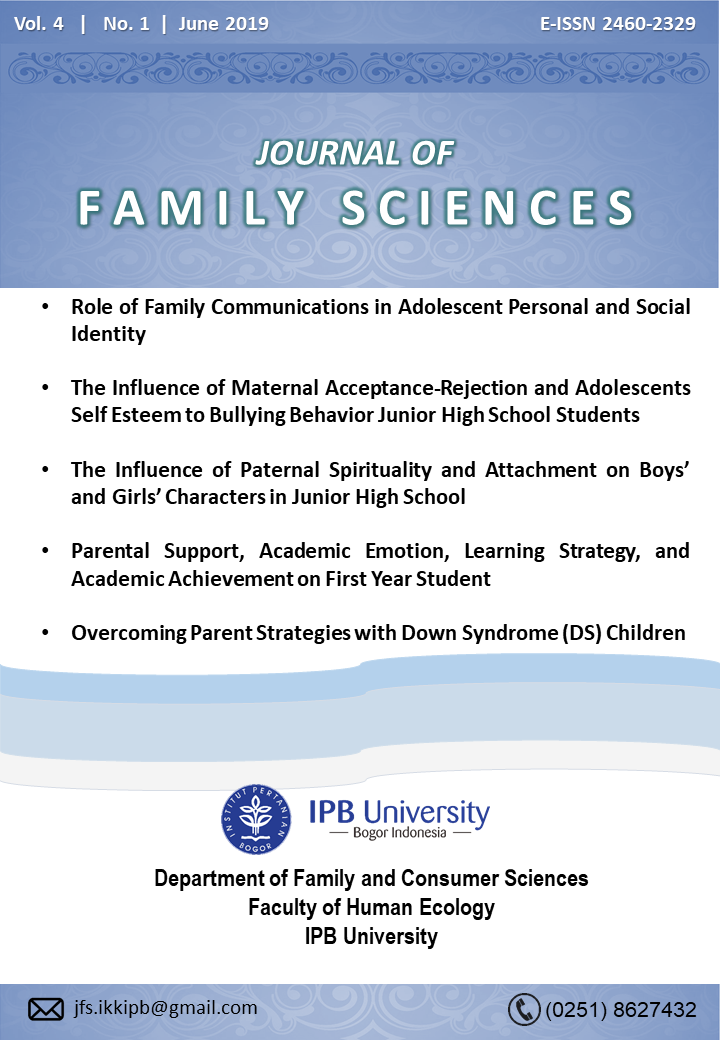Parental Support, Academic Emotion, Learning Strategy, and Academic Achievement on First Year Student
Abstract
The new challenges for first-year students potentially to influence their academic achievement. This study aimed to analyze the characteristics of students and families, parental support, academic emotions, and learning strategies and their effects on the academic achievement of first-year students. Determination of research location by purposive at Institut Pertanian Bogor. An example of this study is a total of 110 students of the Program Pendidikan Kompetensi Umum (PPKU) selected by simple random sampling. The results found that parental support related to emotional and instrumental aspects, positive and negative academic emotions were significantly correlated with the use of learning strategies. The dimension of learning strategy that is time and environment management and effort learning correlated on academic achievement.
Downloads
References
Ahmed. (2013). Emotions, self-regulated learning, and achievement in mathematics:A growth curve analysis. Journal of Educational Psychology, 105(1), 15.
[BPS] Badan Pusat Statistik. (2017). Garis Kemiskinan Menurut Provinsi 2013-2017. Retrieved from: https://www.bps.go.id/linkTableDinamis/view/id/1120. [diunduh 30 Maret 2018].
Caprara, G. V., Fida, R., Vecchione, M., Del Bove, G., Vecchio, G. M., Barbaranelli, C., & Bandura, A. (2008). Longitudinal analysis of the role of perceived self-efficacy for self-regulated learning in academic continuance and achievement. Journal of educational psychology, 100(3), 525.
Chowa, G., Masa, R., & Tucker, J. (2013). The effects of parental involvement on the academic performance of Ghanaian youth: Testing measurement and relationship using structural equation modeling. Children and Youth Services Review, 35(12), 2020-2030. DOI:10.1016/j.childyouth.2013.09.009
Citrandini, M. dan Hernawati, N (2016). Emosi akademik, strategi belajar, dan prestasi akademik siswa sma di wilayah perdesaan. Jurnal Ilmu Keluarga dan Konsumen, 195-205
Cutrona, C. E., Cole, V., Colangelo, N., Assouline, S. G., dan Russell, D. W. (1994). Perceived parental social support and academic achievement: an attachment theory perspective. Journal of Personality and Social Psychology, 66(2), 369-378.
Direktorat Program Pendidikan Kompetensi Umum. (2017). Program Pendidikan Kompetensi Umum dalam Angka. Diambil dari: http://ppku.ipb.ac.id/tpb-dalam-angka. [diunduh 20 November 2017]
Helsen, M., Vollebergh, W., dan Meeus, W. (2000). Social support from parents and friends and
emotional problems in adolescence. Journal of Youth and Adolescence, 29(3), 319-335.
Jelas, Z. M. (2016). Learning support and academic achievement in the malaysian adolescent.
Learning Environ Res 19:221–240. DOI: 10.1007/s10984-015-9202-5
Maslihah, S. (2011). Studi tentang hubungan dukungan sosial, penyesuaian sosial di lingkungan sekolah dan prestasi akademik siswa SMPIT Assyfa Boarding School Subang Jawa Barat. Jurnal Psikologi, 10(2), 103-114.
Novianti, N., Latifah, M. (2014). Pengaruh gaya pengasuhan, motivasi, dan strategi pengaturan diri dalam belajar terhadap prestasi akademik remaja. [skripsi]. Institut Pertanian Bogor, Bogor, Indonesia.
Novita, L dan Latifah, M. (2014). Strategi pengaturan diri dalam belajar sebagai mediator harapan orang tua dan motivasi intrinsik terhadap prestasi akademik. Jurnal Ilmu Keluarga dan Konsumen, 7(2). 143-153.
Papalia, D. E., Olds, S. W. (1981). Human Development. New York, NY: McGraw-hill Book Company. 2nd ed.
Pekrun, R., Goetz, T., Titz, W., Perry, R. P. (2002). Academic emotions in students’ self-regulated learning and achievement: a program of qualitative and quantitative research. Educational Psychologist, 37, 91-105.
Pekrun, R., Frenzel, A. C., Goetz, T., & Perry, R. P. (2007). The control-value theory of achievement emotions: An integrative approach to emotions in education. In Emotion in education (pp. 13-36).
Pekrun, R., Goetz, T., Frenzel, A. C., Barchfeld, P., dan Perry, R. P. (2011). Measuring emotions in students’ learning and performance: The Achievement Emotions Questionnaire (AEQ). Contemporary educational psychology, 36(1), 36-48.
Pintrich, P. R., De Groot, E. V. (1990). Motivational and self-regulated learning components of classroom academic performance. Journal of Educational Psychology. Vol 2 (1), 33-40
Ronaldi, R. (2013). Pengaruh dukungan orang tua dan kemandirian belajar terhadap hasil belajar ekonomi siswa kelas XI IPS SMAN 6 Padang. Jurnal Pendidikan Ekonomi, 2(2).
Sarafino, E. P., & Smith, T. W. (2011). Stress, biopsychosocial factors, and illness. In Chapter IV. Health Psychology: Biopsychosocial Interactions (pp.80-109). John Wiley & Sons, Inc
Situmorang, Z. R. D., dan Latifah, M. (2014). Pengaruh dukungan sosial, konsep diri, dan strategi pengaturan diri dalam belajar terhadap prestasi akademik. Jurnal Ilmu Keluarga dan Konsumen, 7(3), 154-163.
Santrock, J. W. (2013). Adolescence Fifthteen Edition. United States of America, USA: McGraw-Hill Education.
Undang-Undang, R. I. (2003). No. 20 Tahun 2003. Tentang Sistem Pendidikan Nasional, 9.
Wolf, D. S. S., Sax, L., & Harper, C. E. (2009). Parental engagement and contact in the academic lives of college students. Naspa Journal, 46(2), 325-358. DOI: 10.2202/1949-6605.6044.
You, J. W. dan Kang, M. (2014). The role of academic emotions in the relationship between perceived academic control and self-regulated learning in online learning. Computers & Education. DOI: 10.1016/j.compedu.2014.04.018.
Zimmerman, B. J. (1990). Self-regulated learning and academic achievement: An overview.Educational Psychologist. 25(1):3-17. DOI: 10.1207/s15326985ep2501_2.
Authors who publish with this journal agree to the following terms:
- Authors retain copyright and grant the journal right of first publication with the work simultaneously licensed under

This work is licensed under a Creative Commons Attribution 4.0 International License. that allows others to share the work with an acknowledgement of the work's authorship and initial publication in this journal. - Authors are able to enter into separate, additional contractual arrangements for the non-exclusive distribution of the journal's published version of the work (e.g., post it to an institutional repository or publish it in a book), with an acknowledgement of its initial publication in this journal.
- Authors are permitted and encouraged to post their work online (e.g., in institutional repositories or on their website) prior to and during the submission process, as it can lead to productive exchanges, as well as earlier and greater citation of published work (See The Effect of Open Access).



_001.png)



